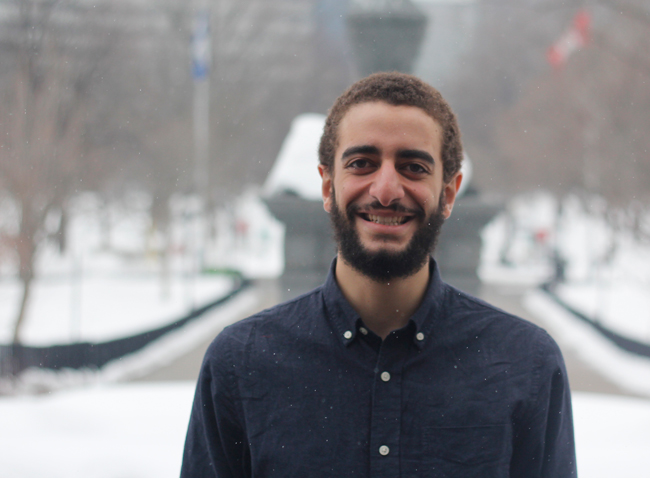
By Neale McDevitt
When asked to describe his leadership style, Kareem Ibrahim laughs, something that comes easily for the in-coming president of the Students’ Society of McGill University (SSMU). “If no one is talking about me, that’s probably a good thing,” he smiles. “During election season [this past March], a lot of people were wondering what my specific politics are. But in reality, a lot of my work will go unseen.”
As Ibrahim sees it, one of his roles as president is to coordinate, delegate and facilitate the various projects of the Executive or, in his words “to keep the whole thing up and running.”
“I’m in a privileged position because I understand people’s needs and I understand the resources that are available on campus to help,” he says. “An important part of my job – and it is something I’m good at – is facilitating those connections.”
And it would be harder to be more plugged in to McGill than Ibrahim. Before being voted in as SSMU president by 225 votes in the March 20 elections, the fourth-year International Development student (minoring in French and Spanish) has served as president of the McGill Inter-Residence Council, Arts Undergraduate Society VP External, Arts Senator and Senate Caucus Representative to SSMU. He is also a floor fellow and a board member of the Educational Community Living Environment (ECOLE) project and QPIRG-McGill. In short, he’s a busy man.
Ibrahim laughs again when asked how he started in student politics. “Back in high school in Ottawa, my best friend said ‘Hey, you should run for Grade 9 rep.’ I had absolutely no idea what that meant, but I did it – and I’ve been involved in student politics every year since.”
As with many in-coming SSMU presidents, Ibrahim points to improving communication with students as a priority. “We have a lot of important issues to deal with in the coming year – but the problem is that many students don’t know about them,” he says. “A lot of our work on the Executive will be reaching out to students on different communication platforms and keeping them informed on what we’re doing.”
Because not everyone uses the same communication tools, this year’s SSMU will try to broaden its communications approach by using everything from Listserv and Facebook to surveys, Instagram and Reddit.
But Ibrahim also understands that while social media is very popular, it can be a double-edged sword. “It can be a very challenging world to navigate – especially in anonymous forums,” he says. “Things can get really complicated when there is conflict or misinformation and no accountability structure in place to help remedy those situations.
“That’s why we have a General Assembly where hundreds of people file into a room and we can have an in-person debate where everyone is more attentive to differing points of view,” he continues. “We sometimes forget the power of face-to-face discussions.”
Looking ahead to the coming year, Ibrahim says he and the SSMU Executive will be focusing on a number of issues, including budget transparency; employment equity at McGill; student-run food operations and promoting students’ interests on issues like consent and mental health counseling.
“MoA (Memorandum of Agreement) negotiations are also happening this year, which will determine the relationship the SSMU has with McGill, so it is huge,” says Ibrahim. “We’re going to make sure our needs are clearly articulated – but that’s another place where student involvement and opinion are vitally important.”
A longtime veteran of student politics, Ibrahim looks at his mandate with equal a good mix of optimism and realism. “As a collective we have huge potential,” he says. “But it is easy to feel disenfranchised with that collective because it is a bureaucracy that is sometimes hard to navigate. I am more than willing to do some of the legwork to help people connect the dots and make sure they get the most out of their time here.
University is a very formative time and there is so much potential for people to find their passion. But not everyone is afforded equal opportunity here. We’ve got a great Executive this year and we want to make sure every student can capitalize on the chances they are afforded,” says Ibrahim. “Our community is so colourful and so full of potential… I just want to tap into that.”
